Annual alumni golf events represent one of the most popular and profitable engagement opportunities for schools, universities, and educational institutions seeking to strengthen alumni connections while generating meaningful fundraising revenue. These celebrations combine competitive golf, networking opportunities, and institutional pride into memorable experiences that keep graduates connected to their alma maters long after graduation.
Yet many institutions struggle with managing the extensive information, historical records, and logistical details that make alumni golf events truly successful. Tournament coordinators find themselves overwhelmed by spreadsheets tracking decades of participants, struggling to share event details across multiple communication channels, and missing opportunities to celebrate the rich history these annual traditions represent. Meanwhile, alumni seek easy access to past tournament results, upcoming event information, and connections to fellow graduates who share their passion for both golf and their alma mater.
This comprehensive guide explores proven strategies for planning, organizing, and maximizing engagement at annual alumni golf events while leveraging modern solutions that streamline information management, preserve tournament history, and enhance participant experience from registration through post-event follow-up.
Effective alumni golf event management extends beyond single-day tournament execution—it creates sustainable systems that preserve historical records, facilitate communication, honor traditions, and build year-over-year participation growth. Institutions that excel at alumni golf programming create experiences where participants feel genuinely connected to their schools, appreciated for their ongoing support, and excited to return annually.
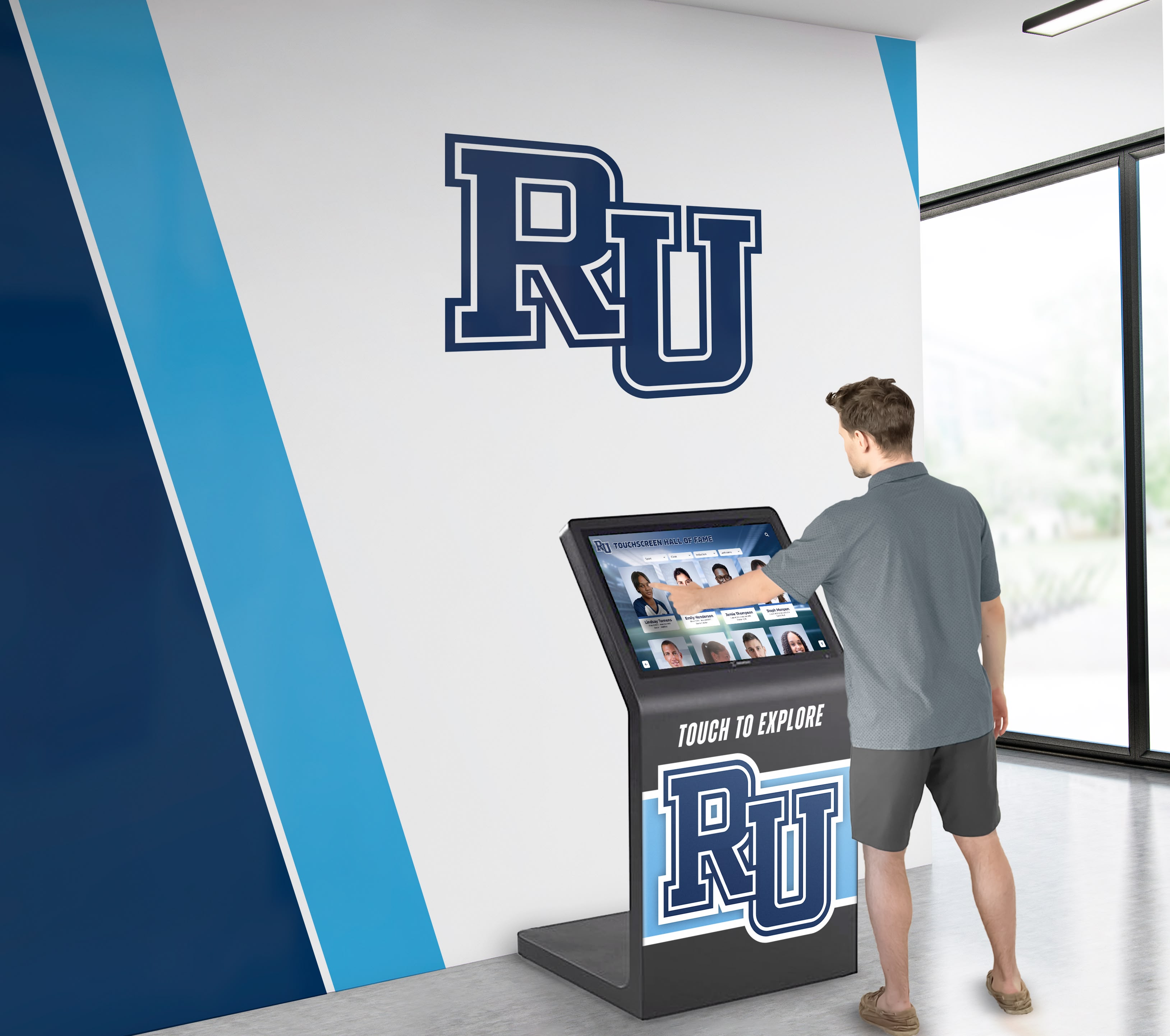
Modern digital platforms make managing alumni golf event information, historical records, and participant engagement more accessible and engaging
Understanding the Value of Annual Alumni Golf Events
Before diving into specific planning strategies, understanding what makes alumni golf events uniquely valuable helps institutions design tournaments aligned with broader engagement and fundraising goals.
Financial Impact and Fundraising Potential
Alumni golf events consistently rank among the most profitable fundraising activities educational institutions can organize. According to industry research, well-executed golf tournaments generate average net proceeds of $15,000 to $75,000, with established events at larger institutions exceeding $100,000 annually.
Revenue Generation Opportunities
Golf tournaments provide multiple fundraising channels including registration fees typically ranging from $150-$500 per golfer, corporate sponsorships from local businesses and alumni-owned companies, on-course game sponsorships for closest-to-pin and longest drive competitions, silent and live auctions during post-tournament receptions, raffle ticket sales featuring donated prizes and experiences, and on-site merchandise sales including branded apparel and accessories.
The combination of direct registration revenue with sponsorship income creates financial sustainability even when registration alone doesn’t cover all expenses. Corporate sponsors particularly value golf events because they combine business development opportunities with community support visibility.
Cost-Effective Engagement Model
Compared to large-scale galas or reunion weekends, golf tournaments offer favorable cost-to-engagement ratios. Golf courses typically provide venue, food service, and operational support as part of comprehensive packages, reducing staffing needs and logistical coordination. The outdoor, activity-based format requires less elaborate decoration or entertainment investment while providing natural conversation opportunities throughout the day.
Alumni Relationship Building and Networking
Beyond financial benefits, golf events create unique relationship-building environments impossible to replicate through other engagement strategies.
Extended Interaction Time
Four to five hours of shared golf activity provides significantly more interaction time than typical alumni receptions or networking events. This extended engagement allows meaningful conversations, relationship rekindling, and new connection formation in relaxed, recreational contexts rather than formal networking pressure.
Cross-Generational Connections
Golf’s universal appeal spans generations, creating natural opportunities for recent graduates to meet distinguished older alumni, for classmates separated by decades to reconnect, and for diverse professional backgrounds to interact around shared institutional loyalty. Tournament formats like scrambles encourage teamwork across generational and professional divides.
Professional Networking Value
Alumni consistently cite professional networking as a primary motivation for event attendance. Golf tournaments attract successful professionals across industries, creating valuable relationship opportunities for career development, business partnerships, and mentorship connections. Institutions that facilitate these connections provide tangible value beyond nostalgia and school spirit.
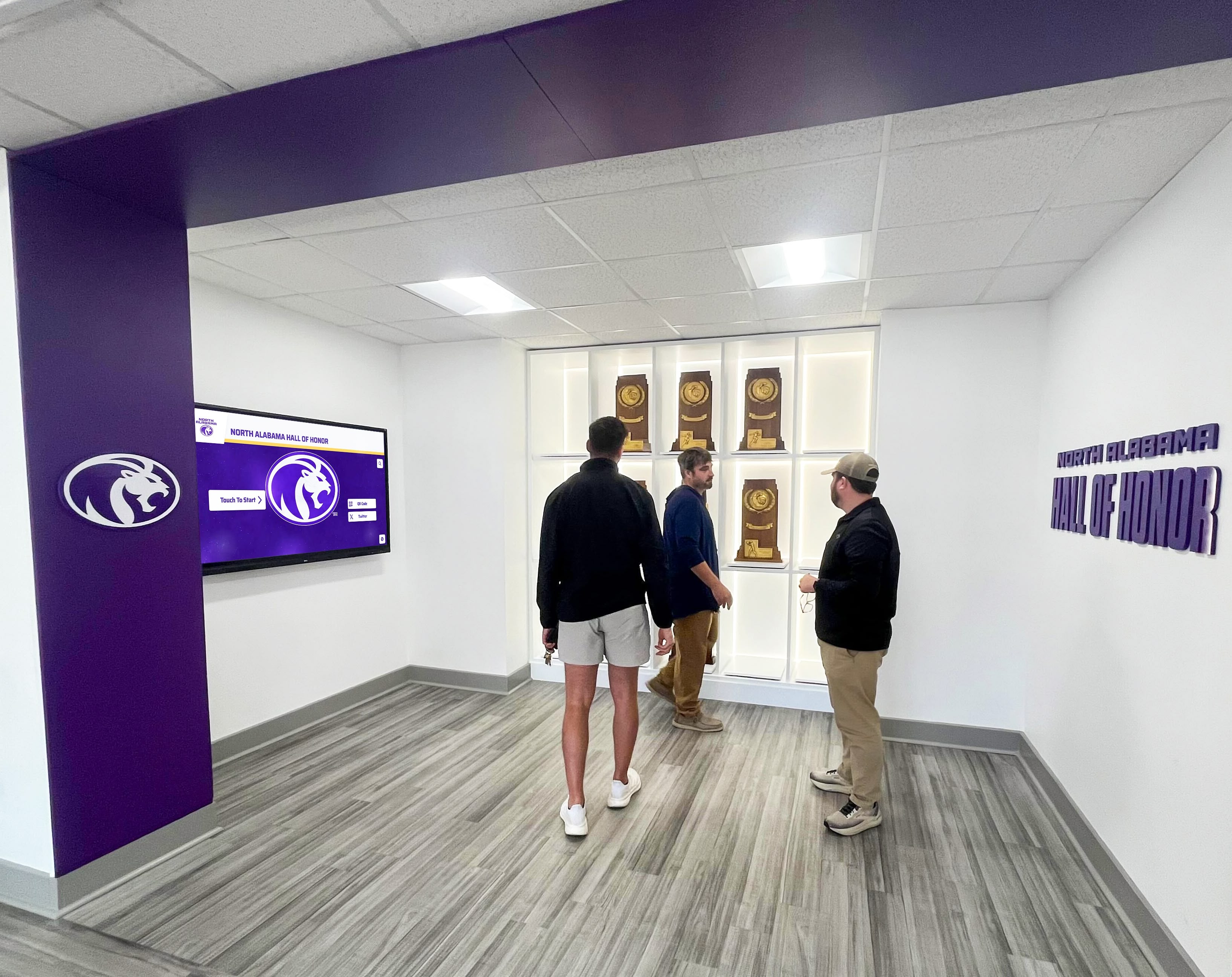
Recognition displays create conversation focal points during alumni events, connecting participants to institutional history and excellence
Institutional Pride and Tradition Building
Successful annual golf events become beloved traditions that strengthen institutional identity and pride.
Continuity and Historical Connection
Multi-decade tournaments create living traditions connecting current participants to alumni golfers from previous generations. When institutions properly document and celebrate tournament history, they transform annual events into cherished rituals that alumni prioritize in their calendars year after year.
Visible Institutional Support
Golf events demonstrate institutional commitment to alumni engagement and community building. The organizational effort, administrative support, and resource investment required for quality tournaments signals that schools genuinely value ongoing alumni relationships beyond graduation fundraising asks.
Competitive School Pride
For institutions with established golf traditions, annual tournaments often develop friendly rivalries with peer schools, creating additional motivation for alumni participation and institutional pride. These competitions extend campus athletic traditions into alumni communities while generating excitement and promotional opportunities.
Learn more about comprehensive alumni engagement strategies that complement golf event programming.
Pre-Event Planning: Foundation for Successful Alumni Golf Tournaments
Comprehensive pre-event planning determines whether golf tournaments achieve their engagement and fundraising potential or fall short due to preventable organizational shortcomings.
Establishing Clear Event Objectives and Success Metrics
Before diving into logistical details, define specific, measurable objectives guiding all planning decisions.
Primary Objective Identification
Different institutions prioritize different outcomes including maximum fundraising revenue for specific programs or scholarships, broad alumni participation emphasizing engagement over profitability, corporate sponsor relationship development and stewardship, student-alumni mentorship connections and career support, or balanced approaches achieving multiple objectives simultaneously.
Clear primary objectives prevent mission creep and enable focused decision-making when planning choices require trade-offs between competing priorities.
Measurable Success Criteria
Establish concrete metrics for evaluating tournament success including total net revenue after all expenses, number of participating alumni and registration trends, new participant acquisition and retention rates, corporate sponsorship revenue and renewal rates, alumni satisfaction survey results and feedback, and social media engagement and promotional reach.
Quantifiable metrics enable objective assessment and year-over-year improvement tracking rather than relying on subjective impressions of event success.
Timeline Development and Task Assignment
Successful tournaments require organized timelines beginning 6-12 months before event dates.
12-Month Planning Timeline
Major planning milestones include:
9-12 Months Before: Secure date and venue through confirmed course booking, form planning committee with defined roles, establish preliminary budget and fundraising goals, and begin sponsor prospecting and outreach.
6-9 Months Before: Finalize event format and competition structure, create registration system and payment processing, launch sponsorship sales campaign, and begin promotional communications to alumni database.
3-6 Months Before: Open player registration with early bird pricing, secure auction items and raffle prizes, confirm catering and hospitality details, and recruit volunteers for event-day operations.
1-3 Months Before: Send reminder communications to registered participants, finalize foursomes and starting times, create event-day schedules and materials, and conduct final sponsor fulfillment coordination.
Week Before Event: Confirm final participant counts with course and caterer, prepare welcome packets and registration materials, conduct volunteer orientation and training, and finalize event-day logistics and contingency plans.
Committee Structure and Responsibilities
Distribute planning workload across functional areas including tournament director providing overall coordination and decision-making authority, sponsorship chair managing corporate relationships and fulfillment, registration coordinator handling player sign-up and communications, volunteer coordinator recruiting and organizing event-day staff, and marketing/communications lead managing promotional activities and materials.
Clear role definition prevents duplicated effort and ensures all critical tasks receive appropriate attention.
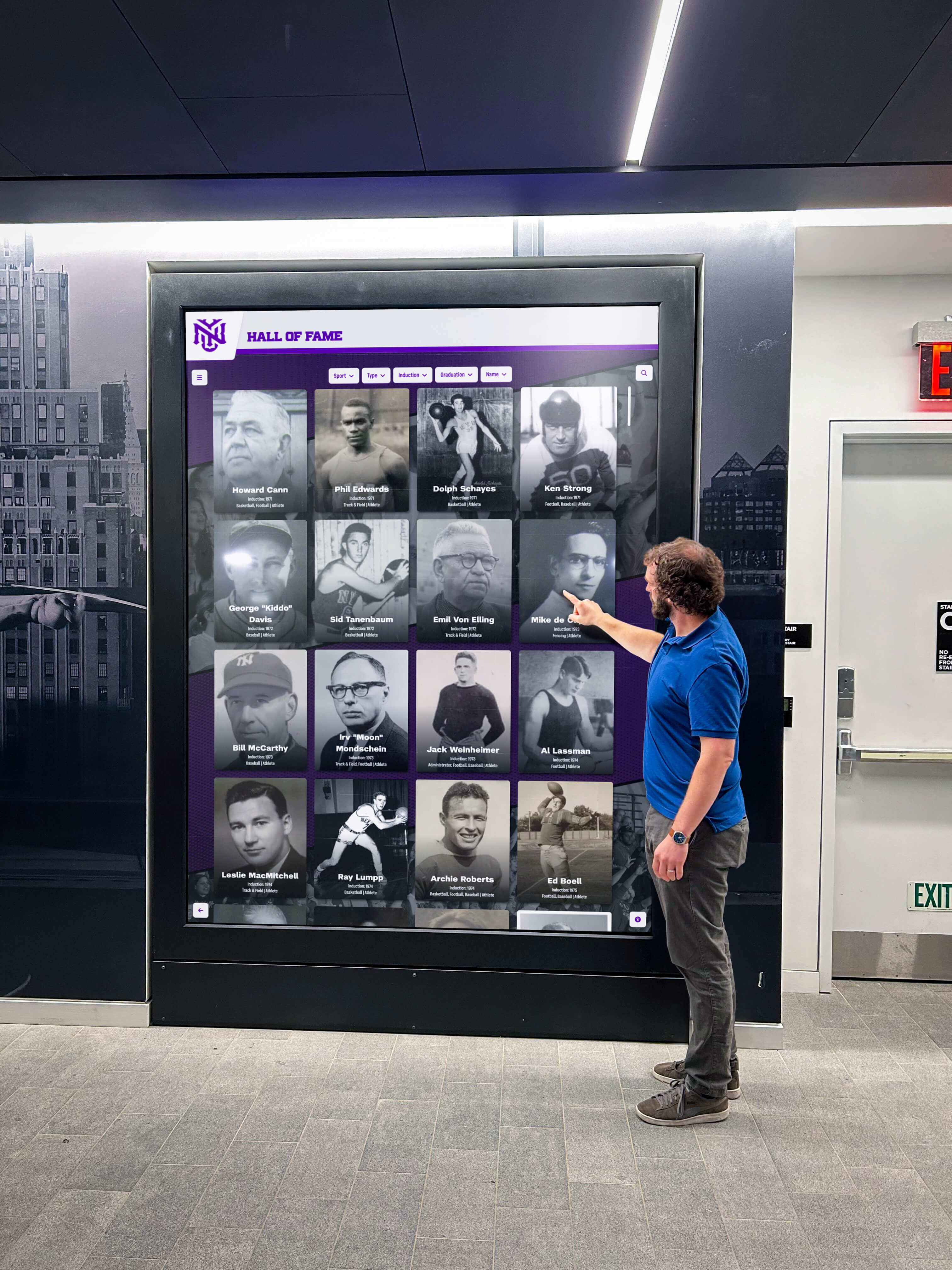
Digital recognition systems enable alumni to explore institutional history and connect with fellow graduates
Venue Selection and Golf Course Partnership
The golf course partner significantly impacts tournament quality, participant satisfaction, and operational efficiency.
Course Selection Criteria
Evaluate potential venues based on location accessibility for target alumni population, course quality and reputation among local golfers, adequate capacity for expected tournament size, inclusive facilities accommodating varied skill levels, quality clubhouse and hospitality amenities, professional staff experienced with tournament operations, and pricing alignment with budget and registration fee structure.
The right course partner becomes collaborative ally rather than simple venue rental, providing expertise and support throughout planning and execution.
Negotiating Favorable Terms
Many courses offer tournament packages including discounted green fees for guaranteed participation numbers, complimentary practice facility access for participants, included food and beverage minimums in pricing, donated auction items or raffle prizes, promotional support through course marketing channels, and flexibility for weather postponement or rescheduling.
Building long-term relationships with course partners often yields improved terms and collaborative support that strengthens tournaments year after year.
Accessibility and Inclusion Considerations
Ensure selected venues accommodate diverse participants through accessible golf cart paths and facilities, adaptive golf equipment availability when needed, varied tee box options enabling participation across skill levels, beginner-friendly course layouts for less experienced golfers, and welcoming, professional staff creating inclusive environments.
Golf events should feel accessible to all interested alumni regardless of athletic ability or previous golf experience. Intimidating or exclusively expert-focused environments limit participation and contradict broad engagement objectives.
Tournament Format and Structure: Maximizing Participation and Enjoyment
Tournament format significantly impacts participant enjoyment, pace of play, and overall event success.
Selecting Appropriate Competition Formats
Different formats suit different participant populations and event objectives.
Scramble Format
The most popular alumni tournament format, scrambles have all four team members hit shots, then play the best shot location for the next stroke. This format offers beginner-friendly participation allowing less skilled golfers to contribute, faster pace of play maintaining energy throughout the day, team camaraderie and collaboration emphasis, and reduced pressure compared to individual scoring formats.
Scrambles work exceptionally well for mixed-skill alumni populations where inclusive participation matters more than serious competitive golf.
Best Ball Format
Each player completes the hole independently, with the team’s score being the lowest individual score on each hole. Best ball provides individual performance recognition within team context, more challenging competition appealing to skilled golfers, faster play than traditional stroke play, and balanced team composition importance.
This format suits alumni populations with generally strong golf abilities seeking more competitive experiences.
Modified Formats and Variations
Creative adaptations can enhance engagement including shot gun starts positioning all foursomes simultaneously across course holes for synchronized timing, alternate shot formats where partners alternate hitting the same ball, Texas scramble where best shot is selected but that player cannot hit the subsequent shot, and handicap adjustments enabling fair competition across skill levels.
Format selection should align with participant skill distribution, desired competition intensity, and pace of play objectives.
Prize Structure and Recognition Categories
Thoughtful prize structures motivate participation while recognizing diverse achievements.
Traditional Competitive Awards
Standard tournament prizes include overall champion team with significant prize or trophy, runner-up recognition for second and third place teams, individual low gross and low net scores, men’s and women’s division winners when applicable, and closest-to-pin and longest drive contests.
Inclusive Recognition Categories
Expand recognition beyond top competitors through “most improved from last year” awards, “best team name or spirit” acknowledgment, “youngest” and “oldest” participant recognition, “traveled farthest” geographic acknowledgment, and “most consecutive years participating” loyalty celebration.
Diverse recognition categories ensure more participants receive acknowledgment while honoring loyalty and enthusiasm alongside pure golf skill.
Historical Achievement Recognition
Annual golf events create opportunities for special recognition including decade participation milestones, all-time tournament champion honors, historical tournament records and achievements, and distinguished alumni golfer acknowledgment.
Solutions like Rocket Alumni Solutions provide ideal platforms for showcasing tournament history, past champions, and milestone achievements through easily accessible digital displays that participants can explore during registration, meals, and post-tournament receptions. This permanent historical documentation transforms single-day events into continuing traditions connecting past and present participants.
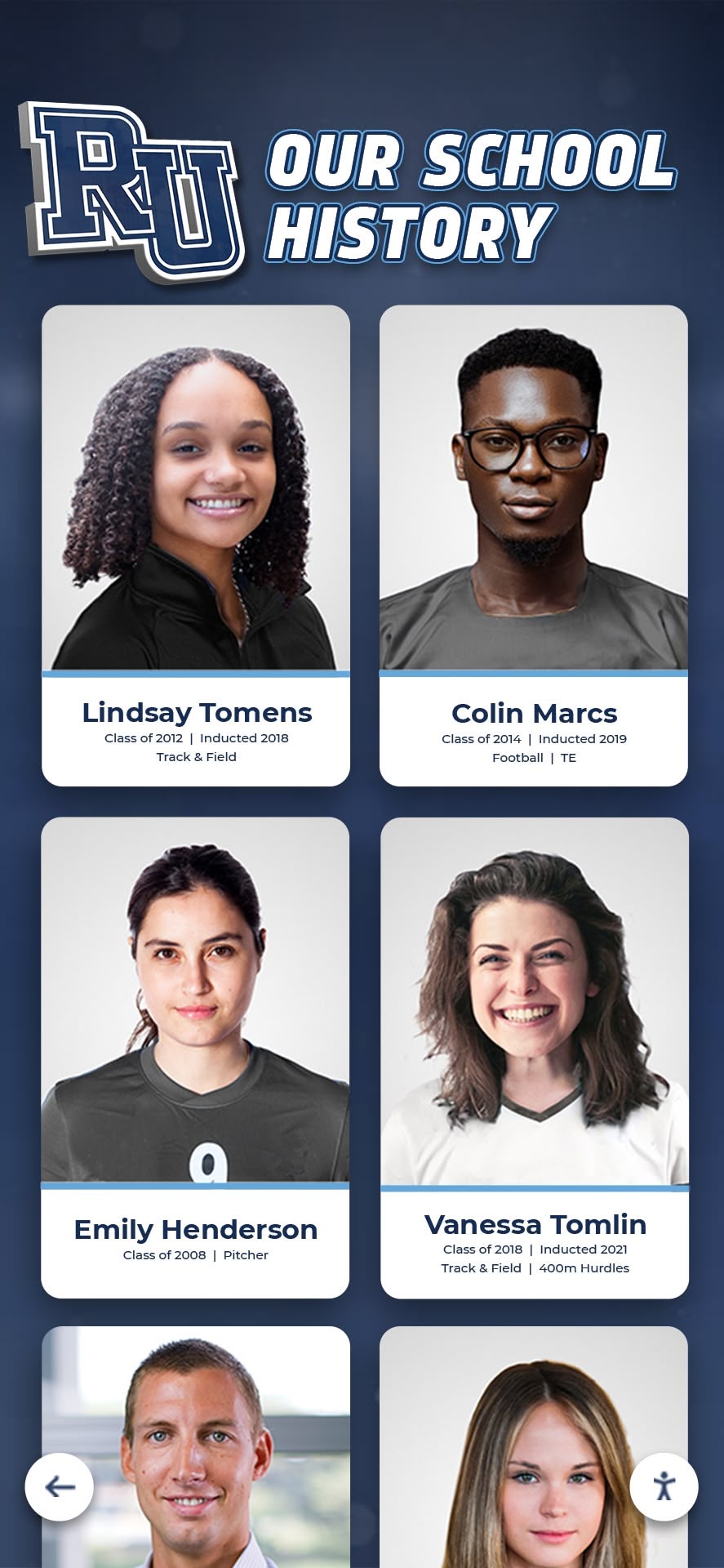
Comprehensive alumni profiles honor individual achievements and contributions across multiple dimensions
On-Course Experience Enhancement
Thoughtful touches throughout the golf experience demonstrate attention to participant satisfaction.
Welcome and Registration Excellence
Create positive first impressions through professional registration tables with organized materials, welcome bags including course maps, sponsor information, and event schedules, refreshment stations with beverages and snacks, photo opportunities with school branding and backdrops, and clear communication about schedule, logistics, and event flow.
Smooth registration processes reduce participant stress and establish positive tone for entire event experience.
On-Course Hospitality
Enhance the playing experience through beverage and snack stations at multiple holes, on-course games and competitions at designated holes, roving hospitality cart service, sponsor recognition signage throughout the course, and volunteer presence providing support and maintaining pace of play.
Thoughtful hospitality throughout the round creates memorable experiences that differentiate institutional events from ordinary golf outings.
Post-Round Reception and Networking
Extend engagement beyond golf through hosted bars and appetizers creating casual mingling opportunities, formal program including award presentations and remarks, silent auction closing and raffle drawings, photo slideshows or videos from the day, and structured networking time before and after formal program elements.
Many participants value post-round networking and socializing as much as the golf itself. Adequate time and appropriate spaces for these interactions maximize relationship-building opportunities that represent core event value.
Managing Event Information: Hotels, Logistics, Sponsors, and Details
Comprehensive information management ensures participants have everything they need while showcasing organizational professionalism.
Pre-Event Communication Strategy
Systematic communication keeps participants informed while building anticipation.
Multi-Channel Information Sharing
Reach alumni through varied communication platforms including dedicated event website with comprehensive information, email campaigns to alumni database with event details, social media promotion across institutional platforms, printed materials mailed to target alumni populations, and personal outreach to past participants and VIP prospects.
Multiple touchpoints ensure information reaches alumni through their preferred communication channels while reinforcing event importance through repeated exposure.
Essential Information Elements
Comprehensive pre-event communications should include event date, time, and location with detailed directions, registration process and deadlines with pricing structure, tournament format and competition rules, schedule of activities from registration through conclusion, dress code and golf equipment requirements, hotel accommodations and travel information, sponsorship opportunities and recognition benefits, and contact information for questions or additional assistance.
Thorough information reduces participant uncertainty and logistical questions while demonstrating professional event management that builds participant confidence.
Hotel and Travel Coordination
For events attracting out-of-town alumni, accommodation and travel support enhances attendance and experience.
Hotel Room Blocks
Negotiate room blocks at convenient hotels offering discounted group rates for event participants, booking deadline information ensuring availability, shuttle service to and from golf course when possible, designated alumni gathering spaces in hotel common areas, and clear reservation instructions with institutional discount codes.
Coordinated accommodations provide convenience while creating additional alumni interaction opportunities before and after the tournament.
Travel Information and Resources
Support traveling participants through airport information and ground transportation options, driving directions with parking instructions, local area information and attraction recommendations, alumni-owned business directories for dining and services, and weather forecasts and appropriate attire suggestions.
Thoughtful travel support particularly benefits alumni unfamiliar with the local area or returning from distant locations. This hospitality demonstrates appreciation for their participation effort and institutional loyalty.
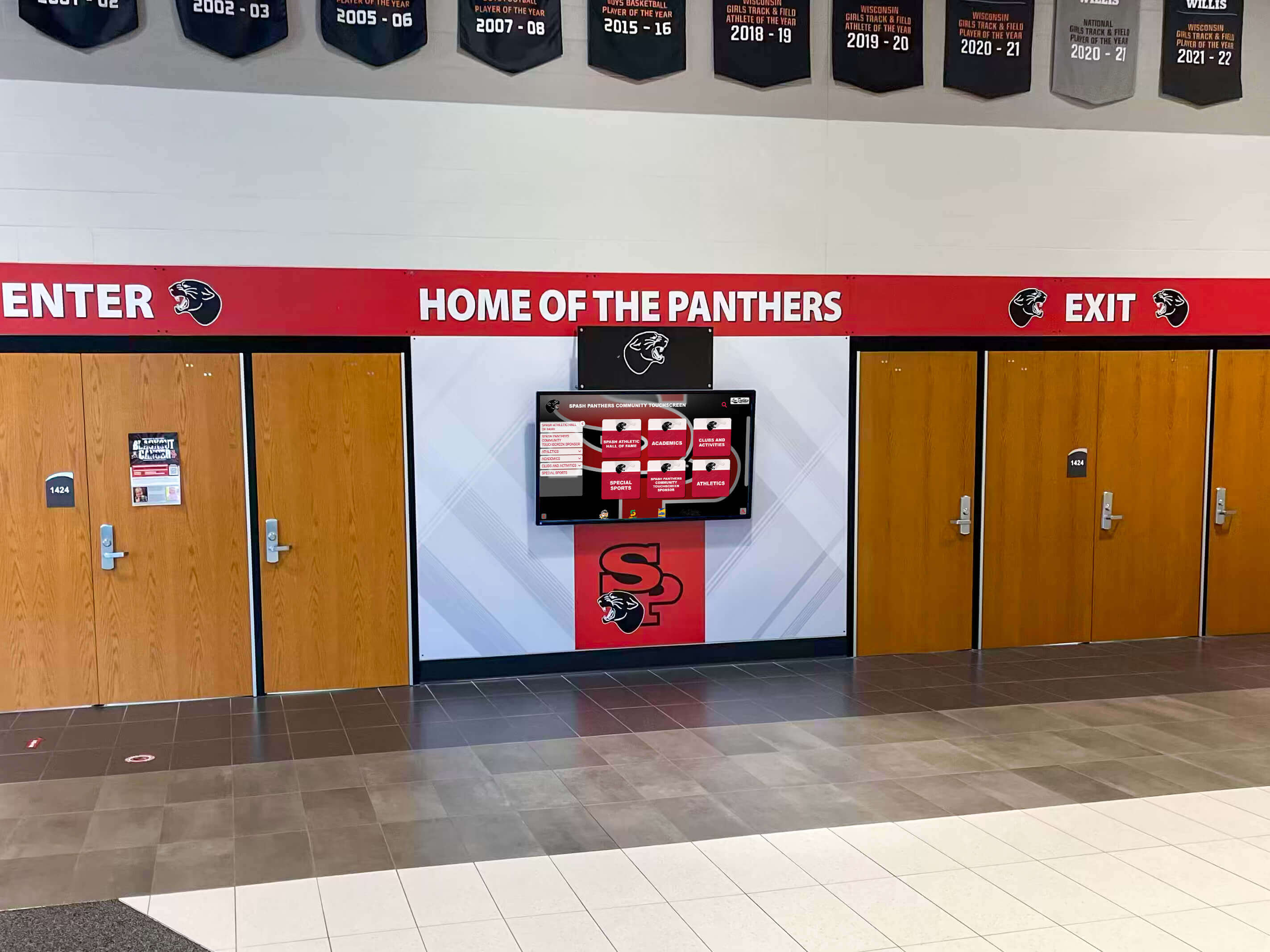
Strategically placed digital displays provide easy access to event schedules, sponsor information, and institutional updates
Sponsor Recognition and Benefit Fulfillment
Corporate sponsors provide critical revenue while expecting professional recognition and benefit delivery.
Sponsorship Level Structure
Create tiered sponsorship opportunities including title or presenting sponsor recognition at premium investment level, major sponsor levels supporting significant event components, hole sponsor opportunities accessible to smaller businesses, beverage cart or hospitality station sponsorship, prize or gift bag sponsorship, and in-kind donation recognition for services or products.
Clear sponsorship structures with defined benefits at each level facilitate sales while ensuring fair recognition for all supporters.
Benefit Delivery and Recognition
Fulfill sponsor benefits systematically through logo placement on promotional materials and signage, recognition in email and social media communications, signage at sponsored holes or hospitality locations, inclusion in event programs and participant materials, verbal recognition during post-tournament program, and post-event reporting documenting attendance and sponsor visibility.
Professional benefit fulfillment strengthens sponsor relationships and improves renewal rates for subsequent tournaments.
Leveraging Technology for Sponsor Visibility
Modern digital platforms enhance sponsor recognition through online event pages featuring sponsor logos and links, social media posts highlighting sponsor support, digital displays at venues showcasing sponsor information, and post-event communications thanking sponsors publicly.
Solutions like Rocket Alumni Solutions enable institutions to showcase event sponsors alongside tournament information, historical records, and participant achievements through centralized digital platforms accessible before, during, and after events. This extended visibility provides sponsors greater value while simplifying recognition management for event coordinators.
Preserving and Showcasing Tournament History
Annual golf events become treasured traditions when institutions properly document and celebrate their history.
Historical Record Management Challenges
Traditional approaches to tournament history preservation create significant obstacles.
Common Documentation Problems
Event coordinators frequently struggle with historical records stored across disconnected systems, past participant data in outdated formats or lost entirely, champion and achievement information existing only in old files, photos and videos scattered across personal devices, sponsorship history difficult to track across multiple years, and no centralized repository enabling easy historical access.
These fragmented records make it nearly impossible to showcase rich tournament traditions or provide participants with historical context connecting them to decades of past events.
The Value of Comprehensive Historical Archives
Proper historical documentation provides multiple benefits including tradition celebration honoring past participants and champions, participant engagement through connections to tournament legacy, recruitment advantages showcasing established, prestigious events, sponsor value through visible long-term institutional commitment, and institutional memory preventing reinvention and preserving best practices.
When alumni can easily access past tournament results, see photos from previous events, and understand the tournament’s evolution over decades, they feel connected to something larger than a single day’s golf outing.
Digital Platforms for Tournament History Preservation
Modern technology solves historical documentation challenges while creating engaging alumni experiences.
Centralized Historical Databases
Digital platforms enable comprehensive record-keeping including complete participant lists across all tournament years, champion and winner records with detailed results, historical photos and videos from past events, sponsor histories recognizing long-term supporters, and tournament evolution narratives documenting changes over time.
Unlike physical records or disconnected spreadsheets, centralized digital systems preserve information permanently while enabling easy updates and additions as new tournaments occur.
Interactive Exploration Experiences
The most engaging historical archives provide interactive access through searchable databases enabling alumni to find specific years or participants, photo galleries showcasing tournament memories across decades, video compilations highlighting memorable moments, statistical summaries showing participation trends and records, and social sharing features enabling alumni to share memories with networks.
Interactive exploration transforms passive historical documentation into engaging experiences that strengthen alumni connections to tournaments and institutions.
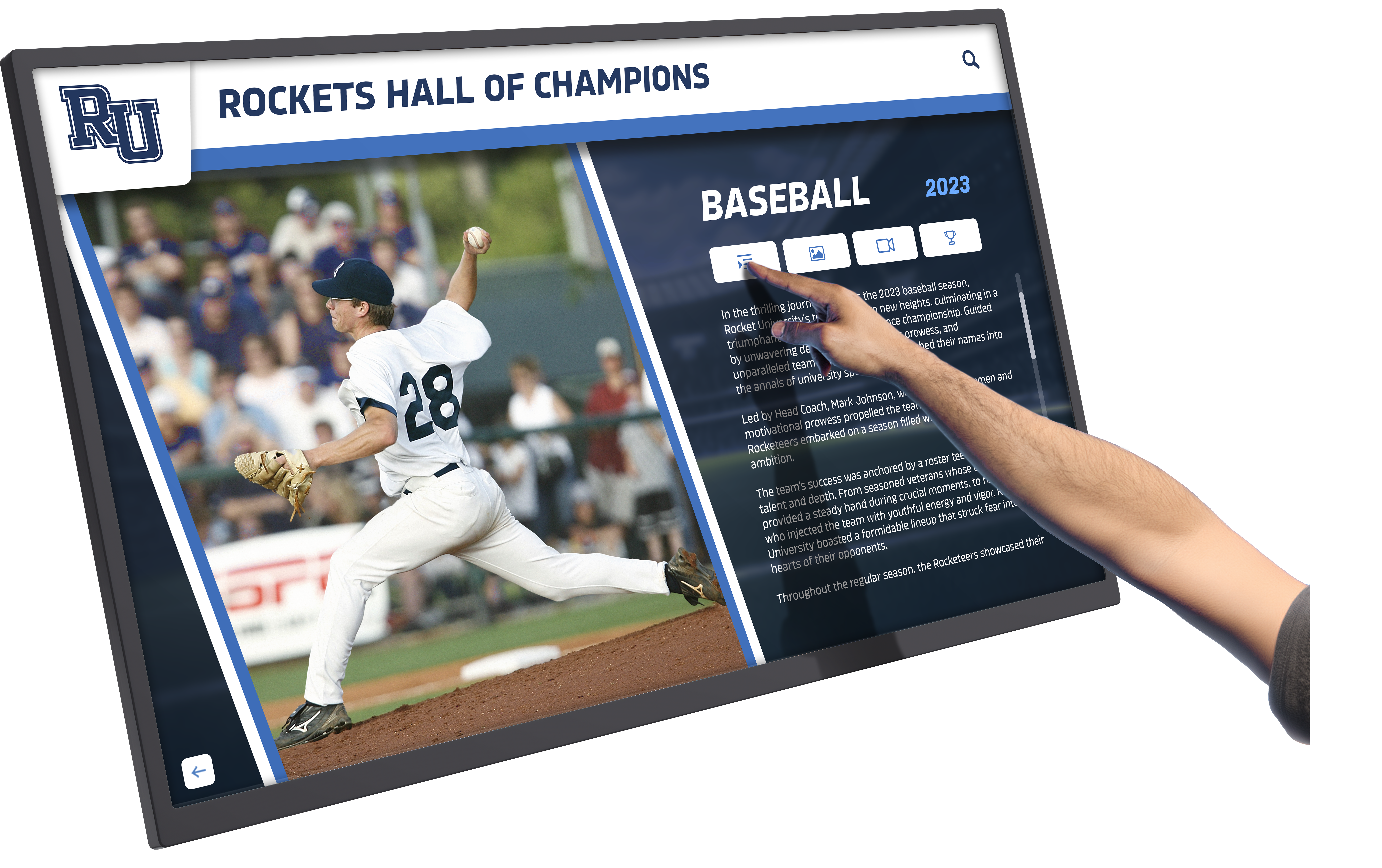
Touchscreen interfaces make exploring tournament history, past participants, and institutional achievements intuitive and engaging
Rocket Alumni Solutions: Ideal Platform for Golf Event Management
Purpose-built alumni recognition platforms like Rocket Alumni Solutions provide comprehensive solutions specifically suited for managing annual golf event information and historical records.
Comprehensive Event Information Management
Solutions like Rocket Alumni Solutions offer centralized platforms where institutions can share upcoming tournament information including dates, times, and locations with registration links, hotel and accommodation recommendations, sponsor recognition and visibility, schedule of activities and format details, and prize structure and competition categories.
This centralized approach ensures all participants access consistent, current information while simplifying updates when details change during planning.
Historical Record Preservation
Digital recognition platforms excel at preserving tournament history through unlimited storage for participant records across all years, champion galleries showcasing winners with photos and details, historical photo and video archives from past tournaments, sponsor recognition documenting long-term corporate supporters, and statistical records tracking participation trends and achievements.
Unlike physical plaques or paper records that decay or become lost, cloud-based digital platforms preserve institutional memory permanently while enabling instant access from anywhere.
Easy Content Management
The most valuable historical platforms require minimal technical expertise through intuitive content management requiring no coding or technical knowledge, cloud-based access enabling updates from any internet-connected device, bulk upload capabilities for adding multiple years of historical data efficiently, template consistency ensuring professional presentation across all records, and regular backups protecting against data loss.
Event coordinators can update tournament information, add new champions, and upload photos without depending on IT departments or external technical support.
Multi-Platform Accessibility
Modern alumni expect information access through multiple channels including web-based access via any browser on computers or mobile devices, on-site touchscreen displays at clubhouses or alumni facilities, QR code access from printed materials, social media integration for sharing and engagement, and email embedding of tournament information and registration links.
Rocket Alumni Solutions provides all these access options through a single platform, maximizing reach while simplifying management compared to maintaining separate systems for different communication channels.
Discover how digital alumni recognition platforms transform event management and historical preservation.
Marketing and Promotion: Maximizing Alumni Golf Event Participation
Even excellently planned tournaments require effective promotion to achieve participation and fundraising goals.
Target Audience Identification and Segmentation
Strategic marketing begins with understanding who you’re trying to reach and tailoring messages accordingly.
Alumni Segmentation Strategies
Different alumni populations require different promotional approaches including recent graduates potentially new to golf events, mid-career alumni often in prime networking stages, established alumni with discretionary income for premium sponsorships, local alumni for whom attendance requires minimal travel, distant alumni needing early notice for travel planning, past participants already familiar with event tradition, and prospective first-time attendees requiring more comprehensive information.
Segmented communication enables messaging customization that resonates with each population’s specific interests and participation barriers.
Value Proposition by Segment
Emphasize different benefits for different audiences including networking and career development for mid-career professionals, recreational enjoyment for avid golfers regardless of age, institutional pride and tradition connection for loyal alumni, family participation opportunities when formats allow guests, community visibility and marketing for corporate sponsors, and tax-deductible giving through registration fees and donations.
Understanding what motivates different populations enables compelling communication that drives registration decisions.
Multi-Channel Promotional Campaign
Comprehensive promotion leverages multiple communication channels reinforcing messages through repeated exposure.
Email Marketing
Email remains the primary direct communication channel with alumni including save-the-date announcements 6-9 months before events, early registration announcements with early bird pricing incentives, reminder communications as registration deadlines approach, last-call messages creating urgency before final deadlines, and post-event follow-up thanking participants and sharing results.
Segment email lists enabling customized messaging to past participants versus prospective new attendees versus corporate sponsor prospects.
Social Media Engagement
Leverage institutional social platforms for broader reach including countdown posts building anticipation, past event throwback photos showcasing tradition, sponsor spotlights recognizing corporate supporters, registration call-to-actions with easy sign-up links, participant testimonials from past attendees, and live event-day coverage sharing real-time highlights.
Social media particularly excels at reaching younger alumni populations and creating organic sharing when participants tag themselves and share posts with personal networks.
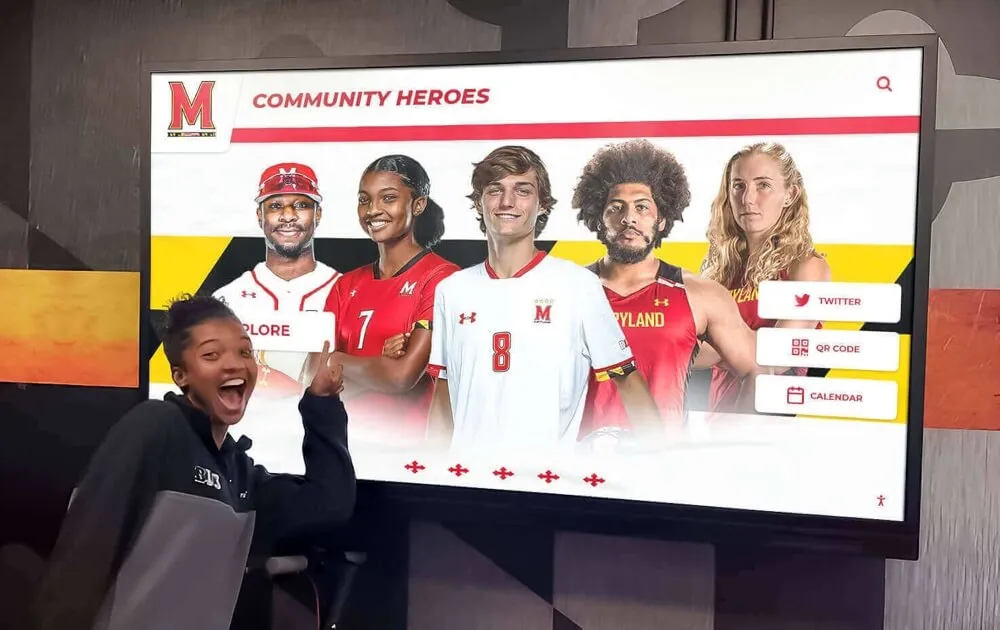
Public displays of institutional excellence and alumni achievement create conversation opportunities and pride-building
Direct Outreach to Key Constituencies
Personalized outreach drives participation from priority populations including personal phone calls to past major sponsors and participants, individualized emails to distinguished alumni and local business owners, ambassador recruitment enlisting enthusiastic alumni to recruit foursomes, and personal invitations from development staff to major gift prospects.
High-touch, personalized outreach demonstrates event importance and significantly improves participation rates among target populations.
Alumni Publication and Website Promotion
Leverage owned institutional channels including alumni magazine features or advertisements, alumni website homepage promotion and dedicated event pages, institutional social media accounts and email newsletters, campus digital displays and athletic venue advertising, and athletic program communications to sports-interested alumni.
Comprehensive promotion across all institutional channels maximizes awareness while reinforcing event legitimacy and importance.
Creating Urgency and Driving Registrations
Converting interest into actual registrations requires strategic motivation.
Early Bird Pricing
Incentivize early registration through significant discounts for registrations months before events, clearly communicated deadlines for discount eligibility, incremental pricing increases as deadlines pass, and final regular pricing weeks before event dates.
Early bird pricing generates early revenue enabling better planning while rewarding alumni who commit early to attendance.
Limited Capacity and Scarcity
Create urgency through genuine capacity limitations with transparent communication about total available spots, public registration counters showing remaining availability, waitlist options when events sell out, and final registration deadlines enforced consistently.
Scarcity motivates fence-sitters to commit rather than waiting indefinitely and potentially missing participation opportunities.
Social Proof and Peer Influence
Leverage social dynamics encouraging participation through public participant lists showing who’s registered, testimonials from past participants describing positive experiences, ambassador recruitment where alumni personally invite classmates and friends, and team registration enabling friend groups to sign up together.
Alumni are significantly more likely to attend when they know friends, classmates, or respected peers will participate.
Learn more about comprehensive alumni engagement through recognition programs that complement event participation.
Event Day Execution: Delivering Exceptional Alumni Experiences
Thorough planning culminates in seamless event-day execution that creates memorable participant experiences.
Registration and Check-In Excellence
First impressions significantly impact overall event perception.
Efficient Registration Processes
Minimize wait times and confusion through clearly marked registration areas with adequate signage, multiple registration stations preventing bottlenecks, pre-sorted materials organized by team or last name, professional staff or volunteers managing check-in, and comfortable waiting areas with refreshments during peak arrival times.
Smooth, efficient registration establishes positive tone while demonstrating organizational competence and attention to participant experience.
Welcome Packet Contents
Provide comprehensive materials enabling confident participation including course scorecard and tournament rules, event schedule and activities timeline, foursome assignments and starting times, sponsor recognition information, food and beverage ticket details, and course map with hole locations and hospitality stations.
Thoughtful welcome packets reduce participant questions while providing sponsor visibility and creating professional impressions.
Volunteer Coordination and Management
Sufficient, well-trained volunteers ensure smooth operations throughout event days.
Volunteer Role Assignment
Strategic volunteer deployment includes registration table staffing, on-course hole monitors at sponsored locations, beverage cart operators, photography and social media documentation, scoring and results compilation, auction or raffle management, and reception or hospitality coordination.
Clear role definitions with specific responsibilities prevent confusion while ensuring adequate coverage across all event components.
Volunteer Training and Support
Prepare volunteers for success through pre-event orientation covering responsibilities, event-day briefing reviewing logistics and contingencies, printed materials with schedules and contact information, volunteer appreciation through meals and recognition, and post-event thank-you communications acknowledging contributions.
Well-supported volunteers deliver better participant experiences while becoming event ambassadors recruiting future participants and volunteers.
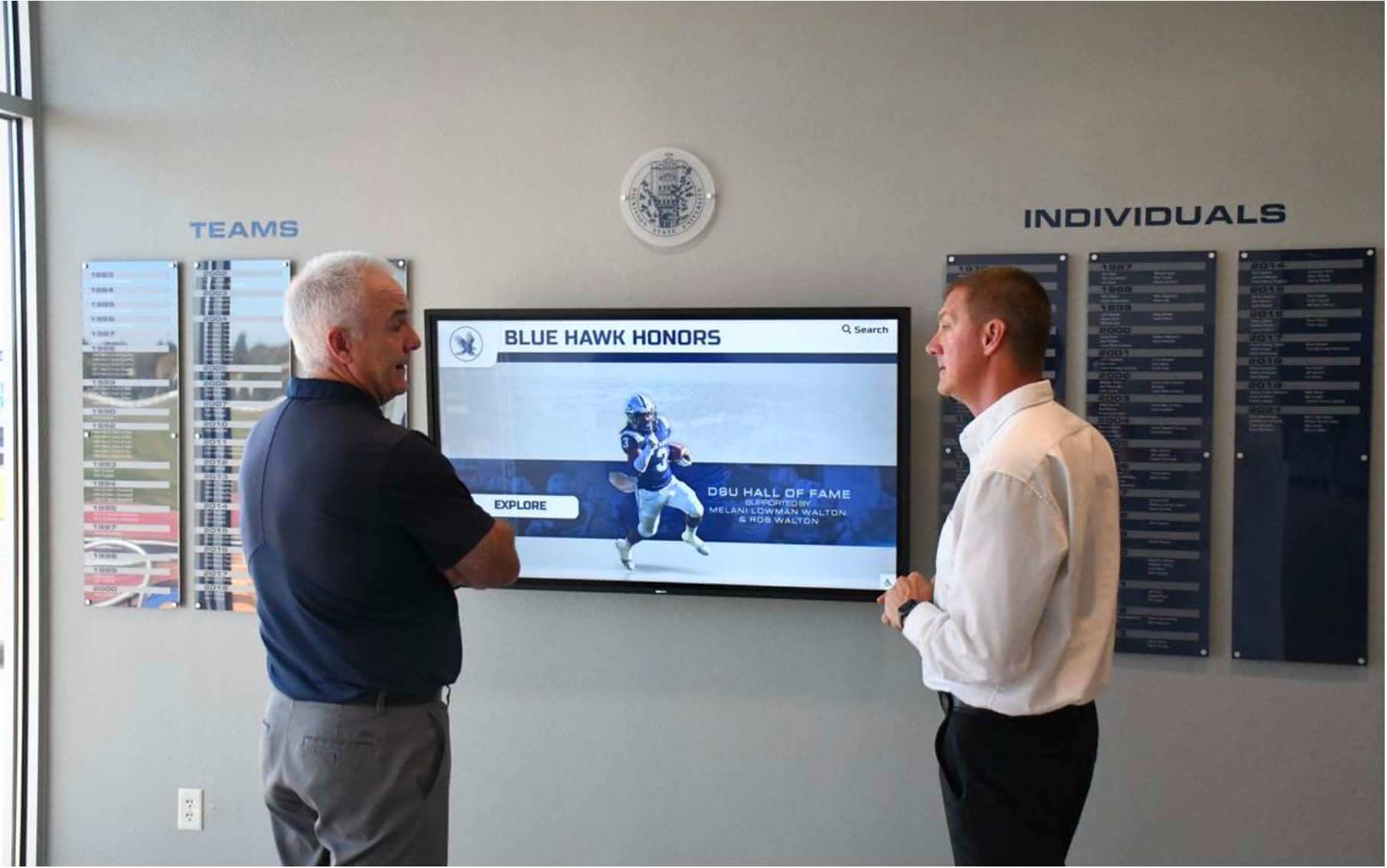
Shared experiences exploring institutional achievements and history strengthen alumni connections during event gatherings
Real-Time Communication and Problem Solving
Inevitable challenges require responsive coordination and problem-solving.
Communication Protocols
Establish reliable communication systems including walkie-talkies or group text messaging for coordination team, clearly designated event coordinator with decision-making authority, emergency contact information distributed to all staff and volunteers, and contingency plans for common challenges like weather delays or pace-of-play issues.
Reliable communication enables quick problem resolution preventing minor issues from escalating into major disruptions.
Weather Contingency Planning
Prepare for unpredictable weather through monitoring forecasts leading up to event day, rain delay or cancellation decision protocols, communication plans for notifying participants of delays or cancellations, refund or rescheduling policies established in advance, and backup date options negotiated with course partners when possible.
Clear weather policies and decisive communication during uncertain conditions demonstrate professional management while maintaining participant satisfaction even when circumstances force difficult decisions.
Post-Event Follow-Up: Maintaining Momentum and Building for Future Success
Strategic post-event activities strengthen relationships, demonstrate appreciation, and establish foundation for future tournament growth.
Immediate Post-Event Communication
Timely follow-up reinforces positive experiences while maintaining engagement.
Thank-You Communications
Send appreciation messages within 24-48 hours including personalized emails to all participants, special thank-you notes to sponsors and major supporters, recognition of volunteers and planning committee members, and social media posts celebrating event success and community participation.
Prompt appreciation demonstrates professionalism while maintaining positive emotional connection when event memories remain fresh.
Results and Photo Sharing
Distribute tournament outcomes and memories including final scores and winner announcements, photo galleries from throughout the day, video highlights when available, sponsor recognition thanking all supporters, and financial results when appropriate for fundraising transparency.
Comprehensive result sharing extends event impact beyond single-day participation while providing content alumni share with personal networks, amplifying promotional reach.
Feedback Collection and Assessment
Systematic evaluation drives continuous improvement.
Participant Surveys
Gather structured feedback through online surveys distributed shortly after events, rating scales for key experience dimensions, open-ended questions capturing specific suggestions, incentives like prize drawings encouraging completion, and follow-up on critical feedback requiring immediate attention.
Participant feedback provides invaluable perspective for planning improvements and understanding what elements drive satisfaction and return participation.
Financial and Participation Analysis
Evaluate objective outcomes including total revenue and expense comparison to budget, net proceeds and cost-per-dollar-raised efficiency, registration numbers and year-over-year trends, new participant acquisition and past participant retention rates, sponsor revenue and renewal indications, and demographic analysis of participant composition.
Data-driven assessment enables evidence-based planning refinements rather than relying on subjective impressions or anecdotal feedback.
Long-Term Relationship Building
Transform single event participation into sustained alumni engagement.
Year-Round Communication
Maintain connections between annual tournaments through periodic email updates about upcoming event planning, social media content celebrating tournament history and tradition, sharing alumni success stories from past participants, promoting related alumni events and engagement opportunities, and early registration reminders for next year’s tournament.
Consistent communication prevents alumni from forgetting about annual events while building anticipation for next year’s tournament.
Historical Documentation and Tradition Building
Preserve each tournament for institutional memory through adding results and photos to permanent historical archives, updating champion records and recognition displays, documenting noteworthy moments and achievements, compiling multi-year statistical trends, and sharing historical content celebrating tournament traditions.
Solutions like Rocket Alumni Solutions excel at this ongoing historical preservation, providing platforms where each year’s tournament adds to growing archives that strengthen tradition and institutional pride. When alumni can explore decades of tournament history through easily accessible digital displays, they understand their participation as part of ongoing legacy rather than isolated single-year event.
Explore comprehensive digital trophy displays and achievement recognition that preserve institutional traditions.
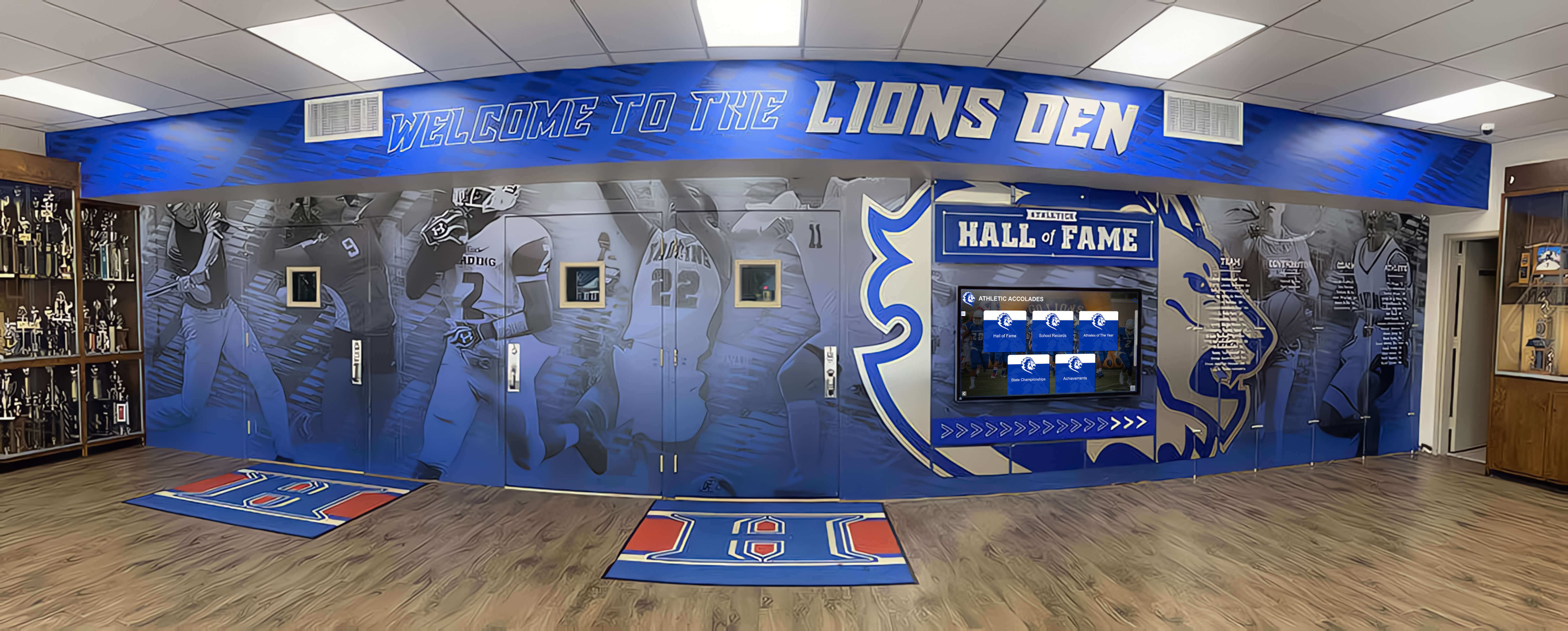
Comprehensive historical displays honor tradition while inspiring current and future participants
Leveraging Technology for Enhanced Alumni Golf Event Management
Modern technology dramatically improves every aspect of alumni golf event planning, execution, and historical preservation.
Online Registration and Payment Processing
Digital registration systems streamline participant sign-up while improving data management.
Registration Platform Benefits
Online registration provides automated data collection and database integration, secure payment processing reducing manual handling, real-time registration tracking and capacity monitoring, customizable forms collecting all necessary information, automatic confirmation emails reducing administrative workload, and reporting capabilities for planning and analysis.
Modern registration platforms eliminate manual spreadsheet management while improving participant experience through easy sign-up processes accessible from any device.
Integration with Alumni Databases
Connect registration systems to institutional databases enabling automatic record updates eliminating duplicate data entry, comprehensive participation history across multiple years, segmented communication based on registration status, donation and fundraising tracking, and demographic analysis for strategic planning.
Integrated systems provide complete pictures of alumni engagement while reducing administrative burden through automated data synchronization.
Mobile Event Apps and Real-Time Scoring
Event-specific mobile applications enhance participant experience while providing valuable engagement data.
Mobile App Features
Dedicated event apps offer real-time scoring and leaderboard updates creating competitive engagement, on-course hole information and game details, push notifications for schedule updates or announcements, social sharing features encouraging participant content creation, sponsor directory and recognition, interactive course maps and GPS features, and post-event photo sharing and memory creation.
Mobile apps transform passive tournament participation into interactive experiences while providing sponsors additional visibility through in-app placement.
Digital Recognition and Historical Archive Platforms
Comprehensive alumni platforms solve information management challenges while creating engaging historical experiences.
Centralized Information Hub
Solutions like Rocket Alumni Solutions provide unified platforms for all golf event information management including upcoming tournament details with registration integration, historical records preserving decades of tournament tradition, participant databases searchable across all years, sponsor recognition showcasing current and past supporters, photo and video galleries creating visual archives, and achievement recognition celebrating champions and milestones.
Rather than managing event websites, historical spreadsheets, photo folders, and separate sponsor databases, institutions centralize all golf event information through single platforms accessible to alumni, staff, and sponsors.
Engaging User Experience
The best digital platforms create intuitive exploration through search functionality enabling alumni to find specific years or participants, filtering options organizing content by year, championship, or category, responsive design ensuring access from computers, tablets, or phones, social sharing features enabling memory distribution, QR code integration connecting physical and digital experiences, and analytics showing how alumni engage with content.
When alumni can easily explore tournament history, find their past participation, and share memories with friends, digital platforms transform from simple databases into engaging community-building tools.
Simplified Content Management
Platforms designed for non-technical users enable ongoing updates through drag-and-drop interfaces requiring no coding, bulk upload capabilities for adding historical data efficiently, template consistency ensuring professional presentation, cloud-based access enabling updates from anywhere, automated backups preventing data loss, and multi-user access allowing distributed content management.
Development and alumni relations staff can maintain current tournament information and preserve new memories immediately after events without depending on website developers or IT departments.
Learn about digital alumni engagement best practices for maximizing platform value.
Building Sustainable, Growing Alumni Golf Programs
Single successful tournaments matter less than sustainable programs that grow stronger year after year.
Multi-Year Strategic Planning
Long-term perspective prevents short-term thinking limiting program potential.
Three to Five-Year Vision
Establish goals for program evolution including participation growth targets by year, revenue progression and fundraising goals, sponsor development and renewal rates, geographic expansion reaching more alumni populations, enhanced experiences and premium additions, and tradition-building initiatives strengthening program legacy.
Multi-year planning enables strategic investments paying dividends over time rather than optimizing only for immediate-year outcomes.
Continuous Improvement Process
Commit to systematic enhancement through annual assessment of outcomes and participant feedback, implementation of high-priority improvements each year, innovation in format or experience elements, best practice research from peer institutions and professional tournaments, and documentation preserving institutional knowledge as leadership changes.
Programs that improve intentionally each year compound advantages over competitors while building reputations as must-attend alumni events.
Sponsor Relationship Cultivation
Corporate sponsors provide financial foundation while expecting professional partnership.
Beyond Transactional Relationships
Develop genuine partnerships through year-round communication beyond tournament asks, authentic interest in sponsor business objectives, creative benefit packages delivering meaningful value, recognition excellence across multiple channels, and performance reporting demonstrating sponsor investment returns.
Sponsors who feel genuinely valued as partners rather than simply revenue sources become loyal, long-term supporters willing to increase investment as tournaments grow.
Benefit Enhancement Over Time
Add value for returning sponsors through premium placement or exclusive benefits for multi-year commitments, first-right-of-renewal opportunities for prime sponsorships, increased visibility as tournaments grow in attendance and prestige, access to alumni networks for business development, and recognition as founding or legacy sponsors in historical documentation.
Growing sponsor benefits alongside tournament growth creates mutual success rather than static relationships that stagnate over time.
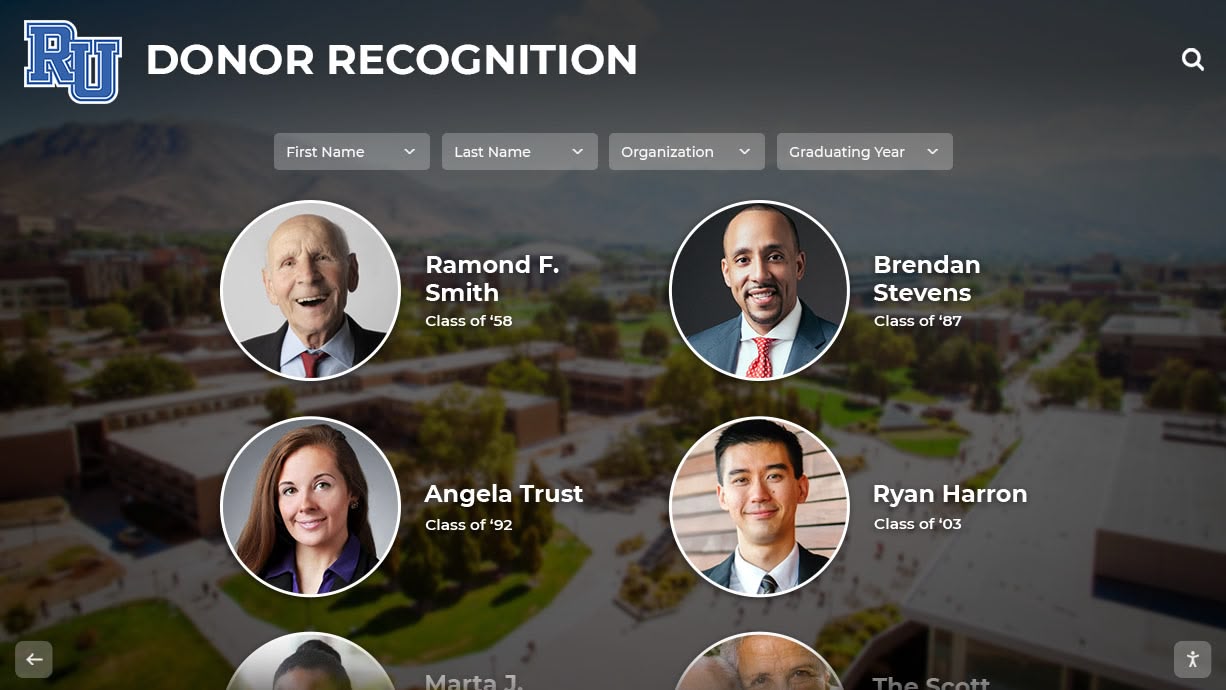
Comprehensive alumni recognition programs create pride and connection that drive sustained engagement
Connecting Golf Events to Broader Alumni Engagement
Golf tournaments work best as components of comprehensive engagement strategies rather than isolated annual asks.
Integration with Alumni Programming
Connect golf events to other initiatives through promoting additional alumni events to tournament participants, creating affinity groups for golf-interested alumni, offering golf-related benefits in giving societies, leveraging tournament relationships for mentorship programs, and using golf events to identify leadership prospects for alumni boards.
When golf tournaments serve as entry points into broader alumni communities rather than siloed activities, they generate compounding engagement benefits beyond single-day participation.
Recognition Program Connections
Link tournament participation to comprehensive recognition including athletic hall of fame celebrations for distinguished athlete-alumni, academic achievement recognition for accomplished graduates, donor recognition acknowledging philanthropic support, and service awards celebrating community contribution.
Comprehensive recognition demonstrates institutional appreciation across multiple dimensions while creating additional touchpoints strengthening alumni relationships.
Learn about building effective alumni recognition programs that complement event engagement.
Conclusion: Creating Alumni Golf Events That Build Lasting Connections
Annual alumni golf events represent powerful opportunities for institutions seeking to strengthen graduate relationships, generate fundraising revenue, and build cherished traditions connecting past, present, and future alumni communities. When schools and universities invest thoughtful planning, professional execution, and modern technology into golf tournament programs, they create experiences that alumni genuinely value and prioritize year after year.
The most successful alumni golf programs share common characteristics distinguishing them from ordinary tournaments competing for the same calendar time and participation dollars.
Excellence in Alumni Golf Programming
Outstanding tournaments systematically address multiple dimensions including comprehensive information management making details accessible across channels, professional historical preservation documenting tournament tradition and legacy, strategic communication reaching target populations through effective marketing, exceptional event-day execution creating memorable participant experiences, meaningful sponsor relationships delivering mutual value, continuous improvement processes driving year-over-year enhancement, and integration with broader engagement strategies building comprehensive alumni communities.
The Technology Advantage
Modern digital platforms dramatically enhance golf event management capabilities while solving persistent challenges that limited traditional approaches. Solutions like Rocket Alumni Solutions provide comprehensive platforms enabling centralized information management for all tournament details, permanent historical archives preserving decades of tradition, easy content updates requiring no technical expertise, multi-platform access through websites, mobile, and touchscreens, sponsor recognition extending visibility beyond single event days, engagement analytics showing how alumni interact with content, and scalable systems growing alongside tournament programs.
Rather than managing information across disconnected spreadsheets, email folders, and photo libraries that become lost over time, institutions can centralize all golf event information through unified platforms that make historical exploration engaging while simplifying ongoing management.
Transform Your Alumni Golf Event Management
Discover how modern digital recognition solutions can help you preserve tournament history, share event information seamlessly, and create engaging alumni experiences that strengthen connections and drive participation growth.
Explore Recognition SolutionsImplementation Pathway
Institutions beginning or enhancing alumni golf programs should start by assessing current event management approaches and identifying key challenges, establishing clear objectives for tournament outcomes and growth, forming capable planning committees with defined responsibilities, selecting appropriate technology platforms for information and historical management, developing comprehensive communication strategies reaching target populations, creating systematic processes for historical preservation, building authentic sponsor relationships delivering mutual value, and committing to continuous improvement through regular assessment and refinement.
Looking Forward
The alumni golf tournaments you create today become traditions that future generations of graduates will cherish and prioritize. Every carefully managed detail, every preserved historical record, every meaningful participant experience, and every genuine connection facilitated through your tournament contributes to institutional culture and alumni community that sustain schools through changing educational landscapes.
Your investment in professional alumni golf event management generates returns far exceeding single-event fundraising through stronger alumni relationships, enhanced institutional reputation, sustained engagement beyond graduation, growing sponsorship partnerships, beloved traditions connecting generations, and comprehensive historical documentation preserving your institution’s ongoing story.
When you provide alumni easy access to comprehensive tournament information, preserve historical records through engaging digital platforms, and create truly memorable event experiences, you transform ordinary golf outings into cherished traditions that strengthen the bonds connecting graduates to their alma maters throughout their lives.
Ready to enhance your alumni golf program through comprehensive digital information management and historical preservation? Explore how Rocket Alumni Solutions can help you create engaging platforms that showcase tournament tradition while simplifying ongoing event management. Learn more about comprehensive alumni engagement strategies that complement golf programming and build stronger graduate communities.




































